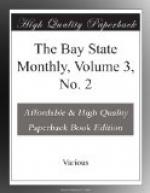As might be anticipated, in subordination to this main interest Mr. David sought to enlarge his knowledge of English men and English institutions. He became familiar with their commercial habits, visiting public buildings and places of historical importance, so that fifty years afterwards he could speak of parks, streets, and sections of the city of London in which any recent event occured as if he had been an eye witness. He was present at the opening of the Liverpool and Manchester Railway when Lord Huskinson was killed, being crushed by the wheels of the locomotive. At this time he saw the Duke of Wellington, with other distinguished men, members of Parliament, and nobility. On his return to America, he brought a machine for winding whip-stocks, the first ever used in this country. The machine was subsequently duplicated, and proved a valuable accession to the trade. He also introduced some new materials, and enlarged the variety of fashions. In other respects the manufacture was unchanged. The prosperity of the firm had no serious checks; they had agencies for the sale of goods in Boston, New York, New Orleans, and large orders came from other cities. They bought materials for cash, so that when the commercial crash of 1837 carried disaster to multitudes, they survived. “We did not fail,” said Mr. David, “for we owed no one anything, but we lost nearly all we had by the failure of others.” The result of this experiment was a contraction of the system of credits and selling goods for cash or by guaranteed commissions.
For many years, the manufacture of whips was the most important business in Amherst. It gave employment to several persons and furnished the means of support to ten or twelve families. The purchases of ivory, whalebone, and other raw material, were usually made from first hands and in such quantities as often gave the firm control of the market; while in the style and workmanship of their handmade whips, they had few competitors.
With the enlargement of their resources, Messrs. Melendy & David became interested in other enterprises. They held real estate and buildings. They bought shares in the railways which were finding their location in New Hampshire. Mr. David belonged to the Board of Directors that laid out and constructed the Northern Railroad. Subsequently this property was sold, and with the proceeds they joined in new undertakings at the West, which subjected the firm to very serious losses. The business was entrusted to others, and unforeseen difficulties arose, attended by material disasters, which no precaution will certainly avert; and failing in the support which was supposed sure, defeat ensued. But these reverses were not without their uses, as subsequent events clearly demonstrated. Accepting the conditions, which were most disheartening, Mr. David and his partner addressed themselves to the work of securing their creditors and restoring their fortunes. It was a long and weary struggle, demanding




